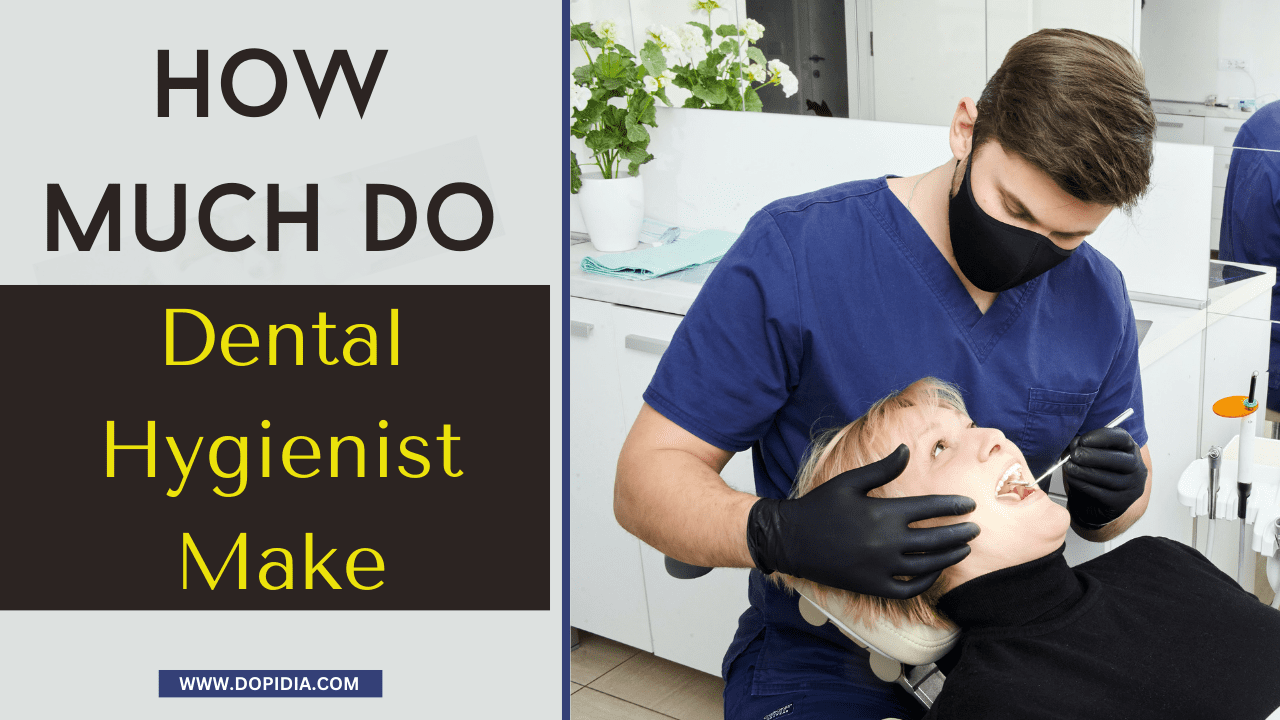How much do Dental Hygienist Make
Hi everyone, my name is Whitney and I’m a dental hygienist. If you’re new here, welcome. If you’ve been here before, welcome back. Today let’s talk about the salary of a dental hygienist.
Average Dental Hygienist Salary in The USA
Depending on the cost of living in your area and the amount of experience you have, the average dental hygienist salary in the USA is just about $76,000 a year.
I jumped right in, didn’t I? But listen, areas in the U.S. with higher cost of living may have dental hygienist salaries that are over $110,000 a year.
An entry-level dental hygienist salary in a more affordable area could be on the lower end, rounding less than $62,000 per year. But higher earners in different types of areas can average $89,000 per year. So the span is between $62,000 and $89,000, right around $76,000.
How much Dental Hygienist Makes Per Hour
If we’re talking about the average that a dental hygienist makes per hour. It’s about $36 per hour. Again, this number could be higher or lower and it depends on what part of the country you’re in as well as the cost of living in that area.
Important Disclaimer
Please note that the salaries, I’m talking about here are based on full-time salaries. It’s super important to keep this in mind because lots, if not most, hygienists are offered part-time jobs.
This is an extremely important disclaimer about everything I just said. So hopefully you’re still listening; you didn’t just click off once you heard all those high numbers. Because sometimes, oftentimes, depends on the area of course, but sometimes you’ll have to be working part-time at two different dental offices. And to add to that, if you are working part-time at two different offices as a part-time job, you’re usually not offered benefits or vacation time.
So these higher paid salaries sound great, but you need to consider that you might be paying for health insurance out of pocket, which is not cheap. So a huge chunk of your paycheck might be going straight to health insurance.
Related Topic: Is Transportation A Good Career Path
Also, if you ever need to take a day off work, you’re probably not going to get paid. Yes, you can take a request a day off, but that’s usually it. There’s no PTO for most part-time jobs. Sometimes, but not always, you will land a job that offers benefits and paid vacation, all that good stuff. I’m not saying it’s not possible, but it is more rare in the private practice setting. More than likely, if you’re getting benefits and PTO and all that stuff, you’ll be working at a corporate office.
Either way, just keep all this in mind in case you’re like, “Wow, dental hygienists get paid?” Yeah, but a lot of that pay goes straight to medical insurance. And if your office doesn’t supply uniforms or a uniform allowance, you gotta pay for your scrubs, and scrubs are expensive.
Financial Considerations in Dental Hygienist Employment
Continuing Education hours (CEs): Another thing that can get quite expensive are continuing education hours (CEs) to keep your dental hygiene license renewed. Each state will have different requirements, but all states will require CE credits. Which some dental offices, if you’re working for a dental office, they might give you a CE allowance, money to pay for your CEs. It’s like sometimes, often, it depends on the area you live, depends on the office you’re working, and there’s so many reasons. But keep this in mind; it’s no big deal either way.
Navigating Compensation and Benefits as a Dental Hygienist
These are just things to think about. The office isn’t wrong or right for giving you a uniform allowance and CE credit or money. It doesn’t make them wrong or right. They are just things to think about and consider and maybe even ask about during your interview. Because if some of this stuff is included, that can be added benefits to make your salary more competitive.
If your office gives you uniform benefits, CE allowances, and a few paid days off with a lower salary, really crunch those numbers and figure it out because it might be worth it. Just because you see a lower number in your salary doesn’t mean you’re making less than other hygienists. Really see what they include. If they include health insurance, that’s a big deal.
Understanding Compensation Structures and Perks
So don’t be upset if you’re making less than someone else who’s a hygienist because they have to pay for health insurance out of pocket, and you need to consider that when you’re crunching numbers. Another thing to consider is that some offices may have you clock out if a patient cancels last minute, but some may allow you to stay clocked in as long as there is work to do around the office.
So again, this is something else to think about if you’re getting paid hourly or even more importantly if you’re getting paid on commission. So some offices choose to pay hygienists based on commission. In this case, then, patient no-shows are extra stressful and a huge thing to think about and ask about during your interview if you’re going to be getting paid commission. But in the majority of situations, the salary is a flat hourly amount. I would say that commission type jobs are more rare, at least in my area. But either way, find out what the protocol is if there’s a patient cancellation.
Salary and Education
Now salary and education. Dental hygienists can hold either a two-year degree or a four-year degree, but their level of education does not affect their license, nor should it impact their salary. So if you’re working chair side clinically in the op as a traditional dental hygienist, the bachelor’s degree versus the associate’s degree generally will not impact your salary.
I have a whole article all about the different career options the bachelor’s degree does offer if you want to learn more about that. I’ll link that article in the bottom bar below because there are different reasons, not salary related, why you would want to get either an associates or a bachelor’s.
Now if you’re interested in relocating or getting licensed in a different state, knowing where the most competitive dental hygiene salaries exist can help you get more bang for your buck when it comes to a job search. Although pay is significantly dependent on the cost of living where the practice is located, it can still be worth your while to explore which areas boast the highest salary.
Regional Variances and Career Options in Dental Hygiene
According to the U.S. News and World Report, the American cities with the highest salary for dental hygienists include:
- Fairbanks, Alaska – about $113,000 per year
- San Jose, California – about $112,000 per year
- Anchorage, Alaska – about $110,000 per year
- San Francisco, California – about $109,000 per year
- Santa Rosa, California – about $108,000 per year
As you just heard, all of those were Alaska and California. So if you want to know about the states, here they are:
- Alaska
- California
- Washington state
- Arizona
- New Jersey
Related Topic: Is Medical Esthetician a Good Career Choice
If you’re someone who wants to work in the dental industry but you don’t know much about the various career paths to choose from, other options include becoming a dentist or a dental assistant or a dental lab tech. Dentists usually make over $150,000 per year.
That’s a super, super, super average just so you know because it totally depends on factors such as location and practice ownership. Dental assistants earn an average of $39,000 annually, while dental lab technicians make around $53,000 per year. These figures may fluctuate based on geographical area and workplace setting. Therefore, understanding salary dynamics and associated costs is crucial when considering a career in dental hygiene.




